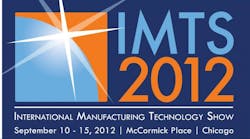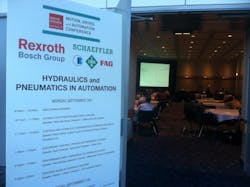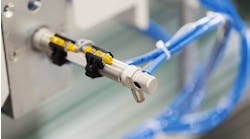The first annual Motion, Drives and Automation Conference — Fluid Power in Automation track — was held at IMTS September 10 and 11, 2012, sponsored by Bosch Rexroth Corp. and presented by Hydraulics & Pneumatics and Machine Design magazines, as part of Penton Media's Design Engineering Group and the National Fluid Power Association.
Click the links below to see full presentations from the Hydraulics in Automation track at the event:
-
Closed-loop position and force control
Considerations and techniques for closing the control loop of electrohydraulic
systems, including the valve, actuator, and controller.
Speaker: Peter Nachtwey, President — Delta Computer Systems -
Energy-efficient hydraulic drives
Simple, yet effective hydraulic components and circuits can be incorporated into a hydraulic system to total cost of ownership, especially energy consumption. -
Controlling hydraulic contamination to improve reliability
Contamination of hydraulic fluid is the top cause of equipment malfunctions, so this
session explores techniques to achieve and maintain clean fluid within a tight budget.
Speaker: Marty Barris, Engine Liquid & Hydraulics Product Director — Donaldson Co. -
Save energy with variable-speed pump drives
Applying variable-speed electric motor technology to a hydraulic power unit can yield
impressive energy savings with no sacrifice in performance.
Speaker: Jan Komsta, Manager, New Technologies & Simulation – Bosch Rexroth Corp. -
Performance and comparison of hydraulic fluids
You can improve the efficiency of a hydraulic system simply by switching to a different
type of fluid that’s more suited to the application.
Speaker: Paul Michael, Research Chemist — Milwaukee School of Engineering -
Reducing noise in hydraulic systems
Noise generated by hydraulic systems can be significantly reduced by following simple design and component selection techniques. -
Electronic control options for pneumatic systems
Today’s pneumatic systems can operate from fieldbus systems, all the way down basic
operators. This session summarizes control options and how to determine which is
best suited to an application.
Speaker: Ryan Hettinger, Application Engineer — Festo Corp. -
Reducing the electrical costs of pneumatic systems
Virtually every manufacturing plant has multiple compressed air systems, which hold
potential to save tens of thousands of dollars in electrical consumption every year.
Speaker: Hank VanOrmer, President — Air Power USA


